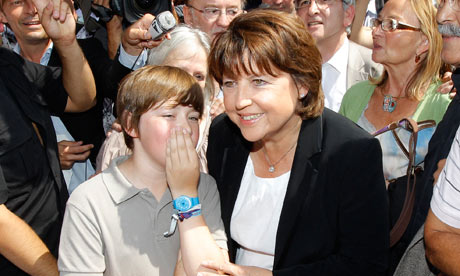The Socialist party leader, Martine Aubry, has launched her campaign to be France's first woman president by trying to soften her hard-left image and appeal to centrists disillusioned with Nicolas Sarkozy. The 60-year-old former labour minister, best known for creating France's 35-hour week, in a speech in her fiefdom of Lille focused on her "dream" to make France a more equal place, not the polarised and gloomy society she said had been left by Sarkozy. Aubry entered the race after the dramatic exit from political life of former Socialist favourite Dominique Strauss-Kahn, who is facing attempted rape charges in the US. She tried to appear more determined to lead the nation, after detractors suggested she lacked "fire in the belly" and had been reticent to run.
The French left is favourite in the polls to win the presidential election in spring 2012, and Aubry's bid marked the start of the Socialists' first ever US-style primary race to select a candidate.
With Sarkozy's low poll ratings beginning to modestly rise again, the Socialists must be able to broaden their appeal to the centre and right. The favourite to win the primary vote in October is François Hollande, a former party leader and centrist who has appealed to the middle class. But Aubry, traditionally placed more to the left, is catching up with him.
Aubry pointedly launched her presidential bid in Lille, where she is mayor and presents herself as close to the people. She chose a local cultural centre, a dig at Sarkozy's famed dismissal of culture and intellectuals during the previous presidential campaign. Aubry, a fan of classical music and a culture expert, will be relying on the backing of key figures in film and the arts.
Crucially, Aubry's stage set – a blue backdrop similar to those used by Sarkozy, French and European flags, with Socialist party logos or Socialist bigwigs – was designed to show she was above party politics and not confined by the creaking Socialist party apparatus.
She took a swipe at Sarkozy's rushed and omnipresent style and his divisive policies that have pitted workers against the unemployed and the French against foreigners. "Behind what looks today like energy, but could be seen as restlessness, the reality is unfair policies that solely benefit the most privileged. It is time that changed," she said. "I want to give back France its strength, serenity and unity."
The northern setting highlighted the Socialists' biggest challenge for 2012. The party has lost the support of the working-class and the old industrial heartlands have recently seen staunchly leftwing areas switch to the far-right Front National.
Aubry also gave a nod to her personal political dynasty – she is the daughter of Jacques Delors, the former Socialist finance minister and president of the European Commission – saying she had learned inclusiveness from her family.
Also expected to stand in the three-month primary race are Ségolène Royal, the defeated Socialist candidate in 2007, and several outsider candidates, including the young MPs Arnaud Montebourg and Manuel Valls.
Leader comment, page 32








